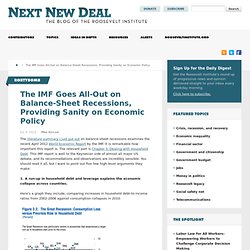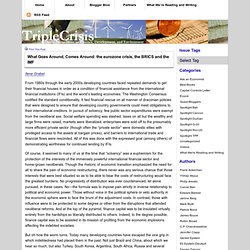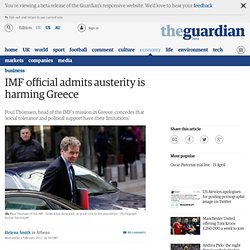

Quelle Surprise! IMF Always Prescribes the Same Austerity Hairshirt. A new paper by Mark Weisbrot and Helene Jorgensen of CEPR have managed to unearth a dirty little secret: the IMF doesn’t just prescribe broadly similar policies in its Article IV consultations, it looks like its hands out the same medicine.

We’ve used the metaphor of breaking countries on the rack, but cutting them to fit a Procrustean bed might be more apt. The IMF Goes All-Out on Balance-Sheet Recessions, Providing Sanity on Economic Policy. The literature summary I just put out on balance-sheet recessions examines the recent April 2012 World Economic Report by the IMF.

It is remarkable how important this report is. The relevant part is Chapter 3, Dealing with Household Debt. This IMF report is well to the Keynesian side of almost all major US debate, and its recommedations and observations are incredibly sensible. You should read it all, but I want to point out five few high-level arguments they make: 1. Here's a graph they include, comparing increases in household debt-to-income ratios from 2002-2006 against consumption collapses in 2010. What Goes Around, Comes Around: the eurozone crisis, the BRICS and the IMF. Ilene Grabel From 1980s through the early 2000s developing countries faced repeated demands to get their financial houses in order as a condition of financial assistance from the international financial institutions (IFIs) and the world’s leading economies.

The Washington Consensus codified the standard conditionality. It tied financial rescue on all manner of draconian policies that were designed to ensure that developing country governments could meet obligations to their international creditors.
International Monetary Fund Home Page. We've yet to kill off the Washington consensus. If the Washington consensus policies are truly dead, then in addition to calling for more overseas aid to meet the millennium development goals (MDGs), readers of this blog should also tell their governments to stop having their representatives on the executive boards of the International Monetary Fund (IMF) and World Bank regularly approve loans with conditions that keep the consensus alive.

Over the last few years, we have heard various claims about the state of Washington consensus policies (fiscal discipline, cutting tax rates, interest rate liberalisation, competitive exchange rates, trade liberalisation, liberalisation of capital flows, privatisation and deregulation of prices and markets). We've been told that the policies have been "damaged", but are still essentially sound, and discredited, and that now we are living in post-Washington consensus world.
Others, however, have rightly questioned if a real break with the past is truly at hand. What was heresy is now (still far from) endorsed as orthodox at the IMF - Opinion.
Marshall Auerback: IMF’s Predatory Policies Likely to Continue with New Leadership. By Marshall Auerback, a portfolio strategist and hedge fund manager.

Cross posted from New Deal 2.0. It doesn’t matter who leads the IMF when the institution is governed by ideology. Greece and Ireland appear to have lost an important political ally with the sidelining of Dominique Strauss-Kahn as both plead for more financial assistance from European partners to avoid an early restructuring of debt. The key word is “appears,” as in truth, arsenic remains arsenic, even if it is coated in sugar by an ostensible champagne socialist like Mr. Strauss-Kahn. Johann Hari: It's not just Dominique Strauss-Kahn. The IMF itself should be on trial - Johann Hari, Commentators. So the fact that Dominique Strauss-Kahn, the former head of the International Monetary Fund (IMF), is facing trial for allegedly raping a maid in a New York hotel room is – rightly – big news.

But imagine a prominent figure was charged not with raping a maid, but starving her to death, along with her children, her parents, and thousands of other people. That is what the IMF has done to innocent people in the recent past. That is what it will do again, unless we transform it beyond all recognition. But that is left in the silence. To understand this story, you have to reel back to the birth of the IMF. The IMF’s official job sounds simple and attractive. Let’s look at how this plays out on the ground. That’s what an institution that was concerned with ordinary people – and accountable to them – would look like. Christine Lagarde And The Demand For Dollars. By Simon Johnson After receiving US support at the critical moment, Christine Lagarde was named Tuesday as the next managing director of the International Monetary Fund.

In campaigning for the job, Ms. Lagarde – the French finance minister – made various promises to emerging markets with regard to improving their relationships with the IMF. But such promises count for little and the main impact of her appointment will be to encourage countries such as South Korea, Brazil, India, and Russia to back away from the IMF and to further “self-insure” by accumulating larger stockpiles of foreign exchange reserves – the strategy that has been followed by China for most of the past decade. Seen from an individual country perspective, having large amounts of dollar reserves held by your central bank or in a so-called sovereign wealth fund makes a great deal of sense; this is a rainy day fund in a global economy prone to serious financial floods.
IMF official admits: austerity is harming Greece. A leading architect of the austerity programme in Greece – one of the harshest ever seen in Europe – has admitted that its emphasis on fiscal consolidation has failed to work, and said economic recovery will only come if the crisis-hit country changes tack and focuses on structural reforms.

Poul Thomsen, a senior International Monetary Fund official who oversees the organisation's mission in Greece, also insists that, contrary to popular belief, Athens has achieved a lot since the eruption of the debt crisis in December 2009. Choosing the IMF's next leader. Sooner than expected, the International Monetary Fund (IMF) will have a new managing director. Why Are the French So Determined To Run The IMF – And What Will It Cost You? By Simon Johnson Just a few years ago, eurozone countries were at the forefront of those saying that the International Monetary Fund had lost its relevance and should be downsized.
The organization was regarded by the French authorities as so marginal that President Nicolas Sarkozy was happy to put forward the name of a potential rival, Dominique Strauss-Kahn, to become managing director in fall 2007. Today the French government is working overtime to make sure that a Sarkozy loyalist and the leader of his economic team – Finance Minister Christine Lagarde – becomes the next managing director. Why do they and other eurozone countries now care so much about who runs the IMF? The euro currency union has a serious problem, to be sure, with the likes of Greece, Ireland, and Portugal, but it is beyond bizarre that these countries now find themselves borrowing from the IMF. Those eurozone treasury and central bank officials had a point. Why does this make sense?
If Ms. In the IMF succession battle, a stench of colonialism. In its daily work, the IMF demands that the governments that seek its financial assistance adopt market principles of efficiency, transparency and meritocracy in exchange for its help.

Yet that same institution selects its leader through a process completely at odds with those values.